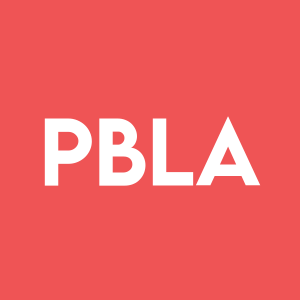Welcome to our dedicated page for Panbela Therapeutics news (Ticker: PBLA), a resource for investors and traders seeking the latest updates and insights on Panbela Therapeutics stock.
Panbela Therapeutics Inc. (PBLA) is a clinical-stage biopharmaceutical company pioneering therapies targeting polyamine metabolism in aggressive cancers. This page serves as the definitive source for verified news and press releases related to clinical trials, research breakthroughs, and corporate developments.
Investors and researchers will find timely updates on PBLA's oncology pipeline, including ivospemin (SBP-101) and combination therapies under investigation. Our curated collection provides essential context for understanding the company's progress in pancreatic, ovarian, and other solid tumor research.
Key content categories include clinical trial milestones, regulatory updates, peer-reviewed data publications, and strategic partnership announcements. All materials are sourced directly from the company and reputable medical journals to ensure accuracy.
Bookmark this page for streamlined access to PBLA's latest developments in cancer therapeutics. For comprehensive analysis of how these updates may impact therapeutic landscapes and investment considerations, consult your financial advisor or medical professional.
Panbela Therapeutics, Inc. (Nasdaq: PBLA) announced significant clinical advancements in its recent earnings call. The FDA lifted a partial clinical hold on its Phase 1 study of SBP-101, which shows promising results with a 62% objective response rate in combination with existing treatments for metastatic pancreatic cancer. Financially, the company reported a net loss of $2.3 million for Q1 2021, an increase from $1.8 million the previous year, with total cash standing at $8.1 million. Future milestones include data releases at the ASCO meeting in June 2021 and the initiation of a Phase 2 study mid-year.
Panbela Therapeutics (Nasdaq: PBLA) will hold a conference call on May 12, 2021, at 4:30 PM ET to discuss first-quarter results for the period ending March 31, 2021. The call can be accessed via toll-free and international numbers provided in the release. The company’s key product, SBP-101, is a therapeutic for metastatic pancreatic cancer, currently showing promising clinical trial results without significant exacerbation of common chemotherapy-related adverse events. For more details, visit Panbela's website.
Panbela Therapeutics (Nasdaq: PBLA) announced that the FDA has lifted the partial clinical hold on its Phase 1 study for SBP-101. This therapeutic candidate aims to treat metastatic pancreatic ductal adenocarcinoma in combination with gemcitabine and nab-paclitaxel. The study will now exclude patients with a history of retinopathy and include ophthalmologic monitoring. SBP-101 has shown promise in inhibiting tumor growth without exacerbating common chemotherapy-related adverse effects. The FDA's decision allows for continued evaluation of SBP-101 in clinical trials.
Panbela Therapeutics, Inc. (Nasdaq: PBLA) announced that an abstract for its product candidate SBP-101 has been accepted for a poster presentation at the ASCO Annual Meeting from June 4-8, 2021. The presentation will focus on SBP-101's potential efficacy as a first-line treatment for metastatic pancreatic ductal adenocarcinoma in combination with standard therapies. While the initial studies indicate promising signals of efficacy, safety concerns remain, as the FDA has issued a partial clinical hold due to serious adverse events requiring further evaluation.
Panbela Therapeutics (PBLA) re-issued its press release to correct a decimal error in Q4 2020 net loss per share. For Q4 2020, net loss was $0.9 million, or $0.09 per diluted share, an improvement from a net loss of $1.0 million and $0.15 per diluted share in Q4 2019. Total cash as of December 31, 2020, stood at $9.0 million. Notable achievements in 2020 included appointing Garry A. Weems as VP of Clinical Development, entering a research agreement with Johns Hopkins, and receiving Fast Track designation for SBP-101 in metastatic pancreatic cancer.
Panbela Therapeutics, Inc. (Nasdaq: PBLA) provided a business update and reported financial results for the year ended December 31, 2020. Highlights include a successful enrollment completion for its SBP-101 Phase 1b trial and a strategic partnership with Johns Hopkins University. The company recorded a net loss of $0.9 million for Q4 2020, improving from a $1.0 million loss in Q4 2019. Total cash stood at $9.0 million, with no debt reported. Looking ahead, Panbela aims to leverage 2020’s accomplishments to advance SBP-101 and explore opportunities beyond pancreatic cancer.
Panbela Therapeutics (Nasdaq: PBLA) announced a conference call on March 25, 2021, to discuss its fourth-quarter results for 2020. The call will feature insights into the performance of SBP-101, a therapeutic candidate for pancreatic cancer, which has shown promise in clinical studies without exacerbating chemotherapy-related adverse events. However, a partial clinical hold has been placed by the FDA due to serious visual adverse events, pending further evaluation. Investors are advised to stay tuned for updates post-call.
Panbela Therapeutics, Inc. (PBLA) has appointed Garry A. Weems, PharmD, as Vice President of Clinical Development. Weems brings over 25 years of oncology experience, previously serving at Cerecor, Inc. Significant milestones expected for SBP-101, a therapeutic for pancreatic cancer, will shape future development plans. The compound has shown potential in clinical studies, with the FDA placing a partial hold on one study due to serious visual adverse events. Continued evaluation and subsequent randomized trials depend on regulatory feedback.
Panbela Therapeutics (Nasdaq: PBLA) announced participation in three virtual investor conferences in March 2021: H.C. Wainwright Global Life Sciences Conference (March 9-10), 33rd Annual ROTH Conference (March 15-17), and Maxim Emerging Growth Conference (March 17-18). The company is developing SBP-101, a therapeutic for metastatic pancreatic ductal adenocarcinoma. Clinical data show potential for tumor growth inhibition without exacerbating chemotherapy-related side effects, though a partial clinical hold from the FDA is currently in place.
Panbela Therapeutics (Nasdaq: PBLA) announced a research agreement with Johns Hopkins University School of Medicine to advance SBP-101, a polyamine analogue aimed at treating pancreatic cancer. This collaboration will explore SBP-101's effectiveness across various cancer cell lines, its biomarker potential, and its compatibility with checkpoint inhibitors. Led by Prof. Robert Casero, SBP-101 has demonstrated tumor growth inhibition in clinical studies without aggravating typical chemotherapy side effects. Future evaluations will depend on regulatory approvals and ongoing clinical trials.

